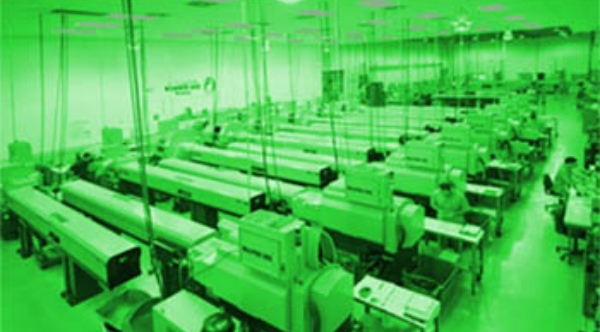Networks are in for light-out factories
Lights can go off, and so can responsibility.

“Lights out” manufacturing is a manufacturer’s wettest dream: a set of techniques that would allow running a production factory with little or no human intervention: " set the machines in motion, flip off the lights, and head out the door. No workers. No humans in the building at all. Just machines…"
To become actually feasible, reliable and profitable this dream requires a lot of technologies to work together, including transferring and remotely processing huge quantities of data, in real time. If the temperature of a furnace, or the flow of some toxic substance are starting to get out of control, you want to notice right away, and not a millisecond later, don’t you? Fact is, the current Internet cannot guarantee such levels of services, and we live in a world where ad-hoc networks are viable only for financial bets, not stuff that actual people may need.
Don’t worry, deterministic IP has arrived
Yesterday, Huawei announced what seems a significant step towards the realization of these factories: “the industry’s first deterministic IP network solution”, that offers microsecond-level single-hop latency and end to end jitter within 30 microseconds, regardless of the number of hops.
In plain English, what Huawei said is that it can now deliver hardware and software for digital communication networks that are fast, wide and reliable enough to actually make lights out factories work, completely controlled by remote offices. Even if between them, on the same Internet, there are millions of people playing games, making video calls, or watching HD movies on Netflix.
According to Huawei, this network of theirs can support centralized remote control of multiple production lines located thousands of kilometers away.
Why this can be bad in NEW ways
Corporations have been offshoring polluting, potentially harmful plants for many decades. Until now, however, managers greedy enough that their plants could become another Seveso or Bhopal had to at least convince, if not themselves, some of their own colleagues and maybe friends, to risk their own skins. That is, to go every day inside the factory that could explode, and sleep close enough to it to be harmed anyway, if it happened at night.
The most harmful potential of lights out manufacturing is not lot of jobs, if nothing else because that would happen, or not, regardless of whether the lights are on or off. It is extreme offshoring of everything for everybody in the company, starting with direct responsibility.
Lights out manufacturing means that not even the managers and supervisors will risk, spend money and pay personal taxes locally anymore. No one working “in the factory” will suffer or give back at all from anything that happens into it.
Of course, “no humans at all” cannot be entirely accurate. Even a lights out factory should employ, as a minimum, some guards to protect itself from terrorism, plain theft and anything in between, right? Wrong. Why pay such salaries, when robot guardians are already available?
Image source: Definitive Guide to Lights Out Manufacturing
Who writes this, why, and how to help
I am Marco Fioretti, tech writer and aspiring polymath doing human-digital research and popularization.
I do it because YOUR civil rights and the quality of YOUR life depend every year more on how software is used AROUND you.
To this end, I have already shared more than a million words on this blog, without any paywall or user tracking, and am sharing the next million through a newsletter, also without any paywall.
The more direct support I get, the more I can continue to inform for free parents, teachers, decision makers, and everybody else who should know more stuff like this. You can support me with paid subscriptions to my newsletter, donations via PayPal (mfioretti@nexaima.net) or LiberaPay, or in any of the other ways listed here.THANKS for your support!